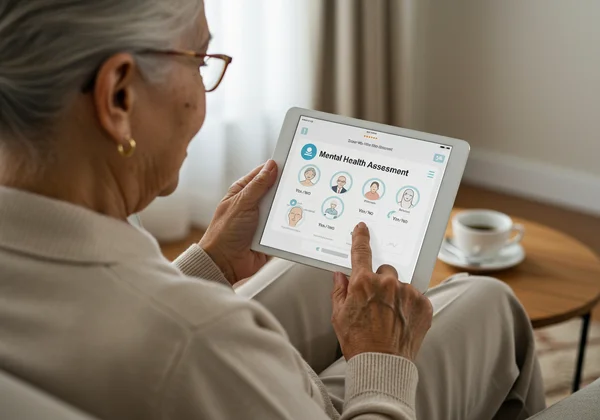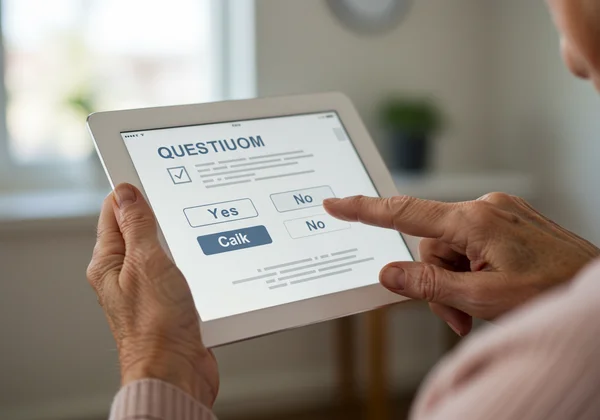GDS-15 vs. GDS-30: ¿Qué Escala de Depresión Geriátrica utilizar?
July 21, 2025 | By Arthur Vance
Cuando se trata de evaluar la salud mental de las personas mayores, la variedad de herramientas de detección puede parecer abrumadora. Sin embargo, comprender el instrumento adecuado puede marcar la diferencia. La Escala de Depresión Geriátrica (GDS) es fundamental para evaluar el bienestar emocional en adultos mayores. Sin embargo, es posible que haya encontrado dos versiones diferentes: la GDS-15 y la GDS-30. Esto plantea una pregunta crucial: ¿Qué es la Escala de Depresión Geriátrica (GDS) y qué versión se adapta mejor a sus necesidades?
Ya sea usted una persona mayor que monitorea su propio estado de ánimo, un familiar preocupado o un profesional de la salud, elegir la evaluación correcta es clave. Esta guía le detallará las diferencias, beneficios y usos ideales para ambas versiones, la corta y la larga, de la GDS. Nuestro objetivo es brindarle la claridad para tomar una decisión informada y dar el siguiente paso con confianza. Puede probar nuestra herramienta gratuita hoy mismo para ver lo simple que puede ser.

Comprendiendo la GDS-15 (Escala de Depresión Geriátrica Versión Corta)
La GDS-15, a menudo denominada la versión corta de la escala de depresión geriátrica, es una versión condensada pero potente de la escala original. Fue desarrollada para ofrecer una manera más rápida y conveniente de detectar síntomas depresivos en adultos mayores sin sacrificar su fiabilidad en la mayoría de los casos de detección. Es un excelente punto de partida para comprender la salud emocional.
¿Qué es la GDS-15 y cuál es su propósito?
La GDS-15 consta de 15 preguntas de "sí/no" diseñadas para ser respondidas basándose en cómo se ha sentido la persona durante la semana anterior. Su propósito principal es servir como una herramienta de detección rápida y eficiente. No está diseñada para el diagnóstico, sino para identificar a las personas que podrían beneficiarse de una evaluación más exhaustiva por parte de un profesional de la salud. Las preguntas se centran en indicadores clave de depresión en personas mayores, como el estado de ánimo, los niveles de energía y la satisfacción general con la vida. Piense en ello como un control preliminar, similar a tomarse la temperatura cuando se siente mal.
Beneficios Clave y Escenarios Ideales para Usar la GDS-15
La principal ventaja de la GDS-15 es su brevedad. Generalmente se puede completar en solo unos minutos, lo que la hace ideal para varias situaciones:
- Para Personas Mayores: Si está revisando sus propios sentimientos, la forma corta es menos agotadora y proporciona una instantánea rápida de su estado emocional actual.
- Para Cuidadores: Al monitorear a un ser querido, la GDS-15 es una herramienta sencilla de usar regularmente sin causar fatiga o resistencia. Ayuda a seguir los cambios a lo largo del tiempo.
- Para Chequeos Clínicos Rutinarios: Los profesionales de la salud suelen utilizar la forma corta durante las citas regulares como una medida de detección rápida para señalar posibles preocupaciones que requieren una mayor exploración.
La GDS-15 es la opción perfecta para cribados iniciales, monitoreo de rutina o cuando el tiempo y la energía son limitados. Puede acceder fácilmente a una versión fácil de usar con nuestra herramienta GDS en línea.

Explorando la GDS-30 (Escala de Depresión Geriátrica Forma Larga)
La GDS-30 es la versión original y completa de la escala de la cual se derivó la versión más corta. Como forma larga de la GDS, ofrece una evaluación más profunda y matizada de la salud mental de un adulto mayor, lo que la convierte en un instrumento valioso para evaluaciones más detalladas.
¿Qué mide la GDS-30?
La GDS-30 incluye 30 preguntas de "sí/no" que cubren una gama más amplia de síntomas y sentimientos asociados con la depresión en la tercera edad. Esta versión fue meticulosamente desarrollada por Yesavage et al. para ser una herramienta de cribado robusta. Profundiza en áreas como el aislamiento social, los sentimientos de vacío y las preocupaciones sobre el pasado y el futuro. Esta exhaustividad proporciona una imagen más completa del estado emocional de una persona, lo cual es crucial para una evaluación integral.
Cuándo optar por la GDS-30: Necesidades de Evaluación Exhaustiva
Si bien la GDS-15 es excelente para detecciones rápidas, la GDS-30 es más adecuada para situaciones que requieren mayor detalle. Considere usar la forma larga en estos escenarios:
- Evaluación Clínica Inicial: Para una primera evaluación exhaustiva por parte de un psicólogo, geriatra o médico de atención primaria, la GDS-30 proporciona una base sólida.
- Cuando los Resultados de la GDS-15 son Límite: Si la puntuación de la forma corta es límite o es poco clara, la GDS-30 puede ofrecer el detalle adicional necesario para la clarificación.
- Para Fines de Investigación: Los investigadores académicos y clínicos a menudo prefieren la GDS-30 por sus datos completos, que son valiosos para estudios sobre la salud mental geriátrica.
La GDS-30 es el estándar de oro para cualquiera que busque una detección detallada y exhaustiva. Si necesita una evaluación detallada, puede comenzar su evaluación con la escala completa de 30 preguntas.

Tomando su Decisión: Comparación GDS-15 vs. GDS-30
Elegir entre la GDS-15 y la GDS-30 no tiene por qué ser difícil. La elección correcta depende completamente de sus objetivos específicos, la persona que se evalúa y el contexto. Ambas versiones están disponibles en nuestra plataforma, lo que le permite seleccionar la que mejor se adapte a su situación.
Diferencias Clave en Preguntas, Tiempo y Profundidad
Aquí tiene un sencillo resumen para ayudarle a decidir:
- Compromiso de Tiempo: La diferencia más obvia. La GDS-15 tarda unos 3-5 minutos, mientras que la GDS-30 tarda entre 5 y 10 minutos. Esto puede ser un factor significativo para personas con energía o concentración limitadas.
- Número de Preguntas: La GDS-15 tiene 15 preguntas, mientras que la GDS-30 tiene 30. Las preguntas adicionales de la GDS-30 aportan más datos para una evaluación más completa.
- Profundidad de la Perspectiva: La GDS-15 es muy eficaz para identificar la depresión potencial. La GDS-30 ofrece un análisis más detallado, lo que la hace más sensible a una gama más amplia de síntomas depresivos. Puede proporcionar una interpretación de puntuación más matizada.
Adaptando su Selección de GDS a Necesidades Específicas (Personas Mayores, Cuidadores, Profesionales)
Ajustemos la selección a sus necesidades:
- Si usted es una persona mayor que desea una autoevaluación rápida y privada, comience con la GDS-15. Es simple, rápida y le da una visión inicial clara.
- Si usted es un cuidador familiar que busca monitorear suavemente el estado de ánimo de un padre a lo largo del tiempo, la GDS-15 es ideal para controles regulares y de bajo estrés.
- Si usted es un profesional médico que realiza una visita de bienestar de rutina, la GDS-15 es una herramienta de cribado eficiente. Para la evaluación de un nuevo paciente o si sospecha de depresión significativa, la GDS-30 proporcionará una base más completa.
- Si usted es un investigador que necesita datos detallados para un estudio, la GDS-30 es el instrumento preferido por su exhaustividad.
Sin importar su rol, nuestra plataforma facilita elegir su versión de GDS y obtener resultados instantáneos y confidenciales.
Potenciando su Viaje de Evaluación de Salud Mental Geriátrica
Tanto la GDS-15 como la GDS-30 son herramientas invaluables para fomentar la concienciación sobre la salud mental entre los adultos mayores. La GDS-15 ofrece velocidad y conveniencia para detecciones rápidas, mientras que la GDS-30 proporciona profundidad y detalle para evaluaciones exhaustivas. La mejor opción es la que se alinea con sus necesidades específicas.
Nuestra plataforma Geriatric Depression Scale se compromete a hacer que este proceso de detección esencial sea accesible, seguro y perspicaz. Ofrecemos tanto la GDS-15 como la GDS-30 de forma gratuita, con puntuación inmediata. Para aquellos que desean ir un paso más allá, también ofrecemos un informe opcional basado en IA que transforma su puntuación en información personalizada y consejos prácticos.
¿Listo para dar el primer paso? Realice la prueba gratuita ahora para comprender mejor su bienestar emocional o el de alguien que le importa.

Preguntas Frecuentes sobre las Versiones de la Escala de Depresión Geriátrica
¿Es la Escala de Depresión Geriátrica una herramienta de diagnóstico?
No, es muy importante entender que la GDS, en sus formas de 15 y 30 ítems, es una herramienta de detección, no una herramienta de diagnóstico. Una puntuación alta sugiere que una persona puede tener depresión y debe ser evaluada por un profesional de la salud cualificado que pueda realizar un diagnóstico formal.
¿Quién puede usar la Escala de Depresión Geriátrica (GDS)?
La GDS está diseñada para adultos mayores, típicamente mayores de 55 años. Puede ser utilizada por las propias personas mayores para autoevaluación, por familiares y cuidadores para monitorear a un ser querido, y por profesionales de la salud para la detección clínica. Nuestra plataforma está diseñada para ser fácil de usar para todos.
¿Cómo se puntúa la Escala de Depresión Geriátrica?
La puntuación se basa en el número de respuestas de "sí" o "no" que se alinean con los síntomas depresivos. Nuestra escala gratuita de depresión geriátrica calcula automáticamente su puntuación y proporciona una interpretación basada en pautas clínicas establecidas, indicándole si la puntuación sugiere depresión leve, moderada o grave.
¿Qué es una puntuación "normal" en la Escala de Depresión Geriátrica?
Para la GDS-15, una puntuación de 0-4 generalmente se considera normal. Para la GDS-30, una puntuación de 0-9 se considera típicamente normal. Sin embargo, cualquier inquietud, independientemente de la puntuación, debe discutirse con un médico. Puede descubrir sus resultados al instante en nuestra plataforma.